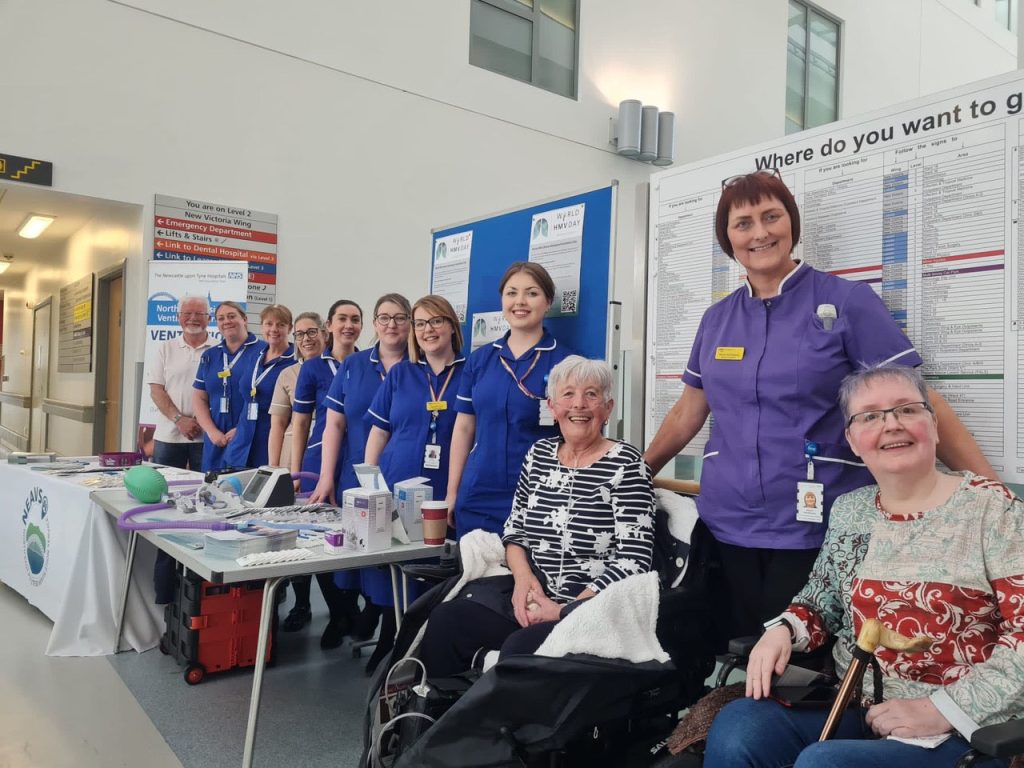Alison Armstrong is a nurse consultant within the North-East Assisted Ventilation Service based at Newcastle’s Royal Victoria Infirmary.
Having worked within the long term ventilation service for the last 20 years Alison has a wealth of experience in the field of long term respiratory conditions in need of ventilation support and is passionate about promoting independence and ensuring an enhanced quality of life for her complex patient group.
She wrote a blog for the Nursing Times about how and why she led on the introduction of the world’s first Home Mechanical Ventilation Day in May this year.
World Home Mechanical Ventilation (HMV) Day
Many awareness events are already recognised, such as those related to chronic obstructive pulmonary disease (COPD) and mental health, and have been established with the objective of putting the spotlight on important healthcare issues.
On 20 May 2023, the Home Mechanical Ventilation in Partnership (HMViP) Group in Partnership added World Home Mechanical Ventilation (HMV) Day to the annual calendar with the intention of sharing the benefits that HMV can provide to certain patient groups and to highlight how it can significantly improve the quality of these patients’ lives.

The HMViP Group was formed in 2019 and works with patients, carers and a multidisciplinary team of health professionals.
As well as launching World HMV Day in May, we also took the opportunity to expand the scope of our website and to add to our existing patient support material to include COPD, neuromuscular conditions, and obstructive hypoventilation syndrome and obesity.
The aim of the group is to raise awareness, share knowledge, improve education among clinicians and HMV users, and to support and represent HMV patients, as well as their families and carers by sharing our common interest in HMV.
Nurse Consultant Alison Armstrong
Home mechanical ventilation (HMV) is a treatment that can have both a survival and quality of life advantage. It is important that when recommending a life-sustaining therapy, it doesn’t add burden to an individual’s life, but adds value.
Someone who uses HMV as a treatment may see improvements in symptoms such as sleep quality, daytime fatigue, concentration and appetite, all of which go towards improving quality of life.
Empowering patients is key
It is also critical that users of home mechanical ventilation are empowered to live the life they want to live. That may include hobbies, activities, travel and spending time with friends and family. Having HMV does not prevent participation in these activities and in fact, can make them more possible and accessible.
Nurses, as well as other health professionals working in this area of practice, will benefit from the information on the HMViP website. The resource provides information and support to enhance the care they deliver to this patient group. We encourage you to visit the site yourselves and also to share the resource with patients who might benefit.
HMV can benefit patients with conditions that damage the lungs, such as COPD and conditions that restrict the movement of air in and out of the body, including obesity, curvature of the spine (also known as kyphoscoliosis), and neuromuscular conditions such as motor neurone disease and Duchenne muscular dystrophy.
Education and information
We have worked closely with the patients, carers and clinicians in the group to offer this educational and informative resource for patients and their families which provides:
- An overview of conditions that can benefit from HMV
- Patient and carer stories
- Clinician’s views on their experience of supporting patients who use HMV
- Transitional services guidance for those moving from paediatric to adult services
- Guidance around troubleshooting
- Top tips for carers
- Travelling with HMV
- Useful links and resources.
At present, the provision of HMV in the UK is not universal, so the HMViP Group is also calling on NHS trusts to consider improving HMV access for patients with chronic respiratory failure, given that it is a cost-effective intervention that can reduce hospitalisation risk and improve symptoms and quality of life in certain patient groups.
The response to the first World HMV Day was really encouraging. We engaged with many new visitors to our website and had tremendous support from the medical profession.
We’re already in the process of planning next year’s event so we hope that you’ll join us to highlight the important benefits which HMV can bring to our patients.
Wealth of expertise
Alison represents nursing on a number of groups. She has a national role as chair for the British Thoracic Society Education and Training Committee.
She is the host of the Specialists in Long-term Ventilation at Home (SiLVaH) national network, which is a non-medical group designed to promote the sharing of ideas, innovations and improvements in this specialist area of practise.
